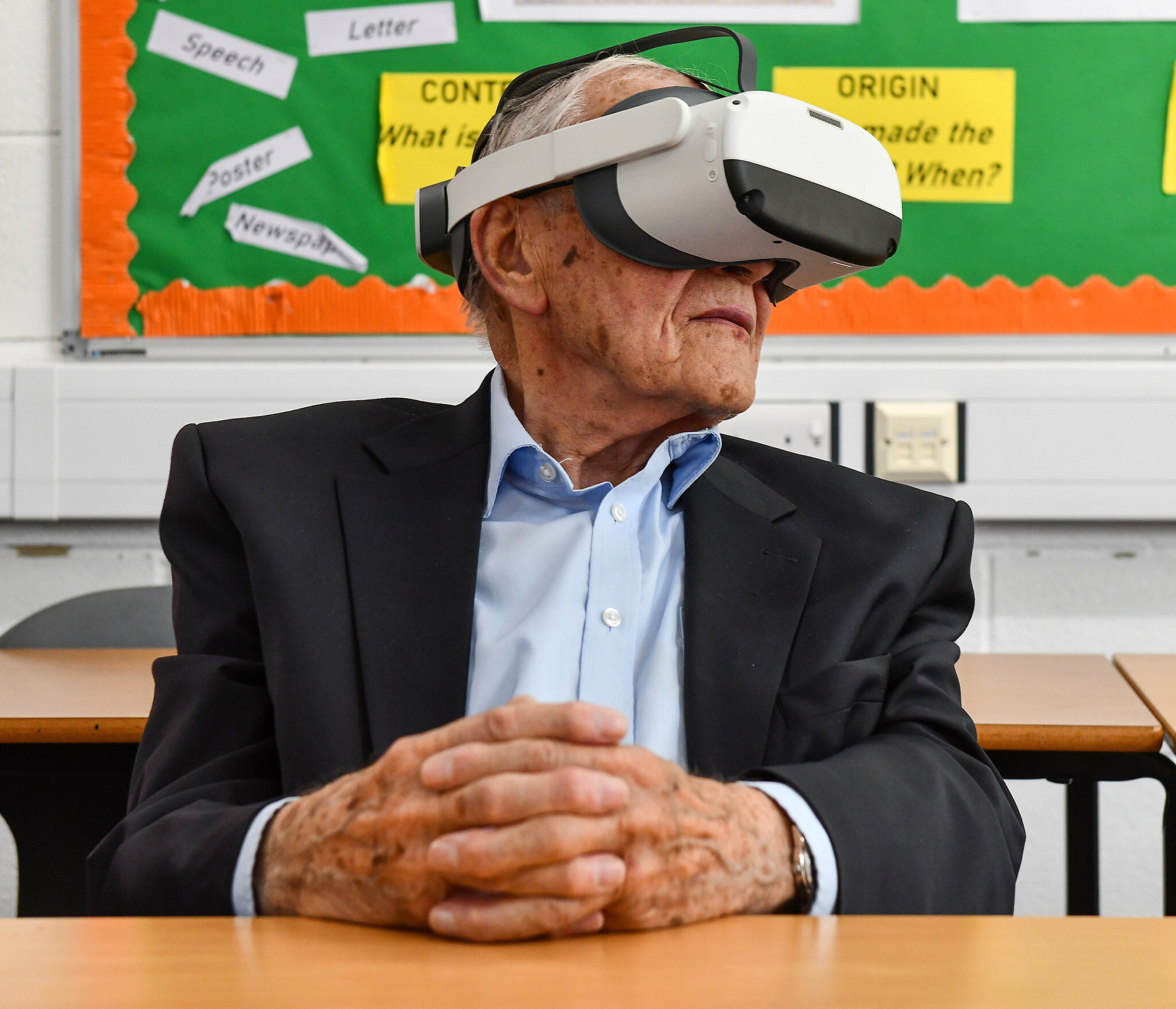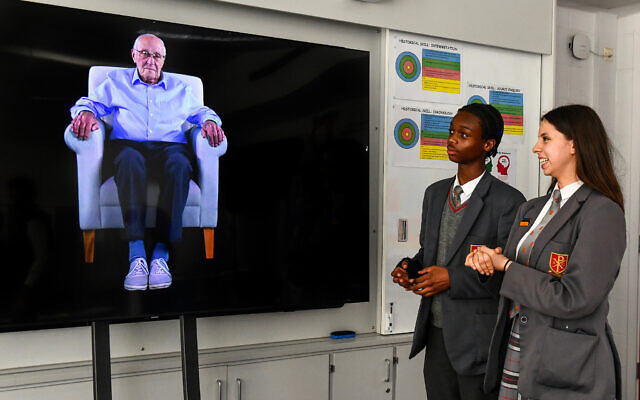‘Immortalising survivors’: The tech that will ensure Holocaust testimony lives on
'I have spoken to thousands of pupils over the years - perhaps now I will make it millions'. Testimony 360 allows UK school pupils to interact with survivor Manfred Goldberg
A groundbreaking new project is using artificial intelligence (AI) and virtual reality (VR) technology to ‘immortalise’ real Holocaust survivors and allow school pupils to have conversations with them – even beyond their lifetimes.
Testimony 360: People and Places of the Holocaust programme, created in conjunction with USC Shoah Foundation, launched this week and is the first of its kind to be seen in British schools.
Costing more than £1million to develop, it rolls out nationally from today after its launch at the Sacred Heart Catholic School in Camberwell, London, where pupils met 94-year old Manfred Goldberg, who was nine years old when war broke out.
He is the first survivor to feature in Testimony 360 and alongside three others – – Susan Pollack, Hannah Lewis and John Dobai – each spent five days being filmed.

They each answered more than 1,000 questions to ensure their virtual self could tackle almost any question a student may pose about their experience of the Holocaust. Susan, Hannah and John’s virtual testimonies are set to be rolled out in schools from 2025.
Testimony 360 is set to revolutionise access to survivor testimony – and wider education – for generations to come. It is designed to support the national curriculum and help Year 9-13 pupils aged 13 to 18 understand the Holocaust.

Currently, Holocaust survivors share their experiences with thousands of students every year. But as survivors become older, fewer and frailer, the community is rapidly approaching a time when this will not be possible, and where the Holocaust is no longer in living memory.
The programme uses technology that allows survivors to continue to have life-like conversations with pupils, sharing their experiences of life during the Holocaust for generations to come. The technology “immortalises” real Holocaust survivors and their stories in the form of ‘interactive survivor testimonies’ – which has been likened to a ‘talking portrait’ and can answer up to 1,000 questions which a student may pose.
Artificial intelligence understands the pupil’s question and then the virtual version of the survivor responds with their actual, recorded answer to the question, with technology ensuring it feels like a smooth and natural conversation.

After ’speaking’ with the survivor, students then use virtual reality headsets to explore key sites related to the survivor’s story, such as where the survivor lived before the war, the places where they were deported, and the concentration camps or ghetto where they were detained – all without leaving their classrooms.
Through virtual reality headsets, students can explore multiple 360° stereoscopic virtual spaces connected to survivor testimonies, where they are also able to interact with additional artefacts that bring survivor stories to life.
In the VR (virtual reality) depiction of Stutthof concentration camp, where survivor Manfred Goldberg was detained, students can engage with items ranging from a prisoner uniform; a tool used by prisoners who were forced in to labour at the camp and a cigarette case, engraved by an inmate whilst at the camp – all of which help students consider daily life in the camp.

Karen Pollock, chief executive of the Holocaust Educational Trust said: “Testimony 360 is a groundbreaking educational programme which will revolutionise how we learn about the Holocaust, allowing young people to hear from eyewitnesses even when they are no longer with us.
“While it is impossible to replace survivors, Testimony 360 will help to ensure that their incredible legacy lives on beyond their lifetimes, and that generations to come will still be able to have the unparalleled experience of hearing directly from a Holocaust survivor, and visiting the places they lived, were imprisoned, and rebuilt their lives. With the threat of antisemitism reaching levels not seen since the liberations of the camps, this programme could not be more vital in ensuring that young people understand where antisemitism can and did lead.”

Holocaust survivor Manfred Goldberg said: “This technology is simply remarkable – it feels close to magic. Never during those dark days of the Holocaust did I ever imagine that one day I would see myself, and my story, immortalised in this way. I have spoken to thousands of pupils over the years – perhaps now I will make it millions. If this is my legacy, it will be a truly remarkable one.”
Mr Richard Price, history teacher at Sacred Heart Catholic School, said: “It was an absolute honour that my class was chosen to be the first in the UK to experience Testimony 360. We have previously been lucky enough to have survivors speak in our school, but this will ensure that future generations of school children will get the opportunity to do the same, even when survivors are sadly no longer with us.

“Combined with the virtual reality aspect, it allows pupils to connect with the people and places of the Holocaust like never before. It’s really exciting to think about the wider applications for history teaching this sort of technology could have in the future.”
Testimony 360 is sponsored by The Eyal & Marilyn Ofer Family Foundation in partnership with the Holocaust Educational Trust and the USC Shoah Foundation.
- Any school in Britain can now sign up for the Testimony 360 programme HERE for sessions to take place from September 2024.

Thank you for helping to make Jewish News the leading source of news and opinion for the UK Jewish community. Today we're asking for your invaluable help to continue putting our community first in everything we do.
For as little as £5 a month you can help sustain the vital work we do in celebrating and standing up for Jewish life in Britain.
Jewish News holds our community together and keeps us connected. Like a synagogue, it’s where people turn to feel part of something bigger. It also proudly shows the rest of Britain the vibrancy and rich culture of modern Jewish life.
You can make a quick and easy one-off or monthly contribution of £5, £10, £20 or any other sum you’re comfortable with.
100% of your donation will help us continue celebrating our community, in all its dynamic diversity...
Engaging
Being a community platform means so much more than producing a newspaper and website. One of our proudest roles is media partnering with our invaluable charities to amplify the outstanding work they do to help us all.
Celebrating
There’s no shortage of oys in the world but Jewish News takes every opportunity to celebrate the joys too, through projects like Night of Heroes, 40 Under 40 and other compelling countdowns that make the community kvell with pride.
Pioneering
In the first collaboration between media outlets from different faiths, Jewish News worked with British Muslim TV and Church Times to produce a list of young activists leading the way on interfaith understanding.
Campaigning
Royal Mail issued a stamp honouring Holocaust hero Sir Nicholas Winton after a Jewish News campaign attracted more than 100,000 backers. Jewish Newsalso produces special editions of the paper highlighting pressing issues including mental health and Holocaust remembrance.
Easy access
In an age when news is readily accessible, Jewish News provides high-quality content free online and offline, removing any financial barriers to connecting people.
Voice of our community to wider society
The Jewish News team regularly appears on TV, radio and on the pages of the national press to comment on stories about the Jewish community. Easy access to the paper on the streets of London also means Jewish News provides an invaluable window into the community for the country at large.
We hope you agree all this is worth preserving.






















